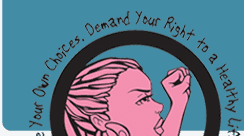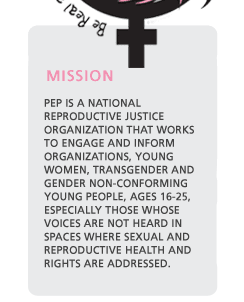Now, I don't want to say this too loudly to a movement that already has so much on its plate, but the reproductive health and rights of young women must become a greater priority for a movement whose viability depends on the activism of youth to survive.
We have recently experienced some landmark developments in our field, such as the FDA approval of the human papiloma virus (HPV) vaccine Gardasil and prescription-free Emergency Contraception for people over 18. But until we can assure reproductive autonomy for all young people, we have little time to pat ourselves on the back.
Historically, adults, even progressive women in the reproductive rights movement, have acted as if they know best what young women need - and have typically only listened to young women with one ear. So what can we do as a movement to support young women in the fight against reproductive oppression and in the struggle for reproductive justice?
There are many ways to create and support spaces for young women's voices within this movement and to connect with them by focusing on their needs rather than our own agendas.
First, young people are growing up in a culture that exploits teen sexuality and at the same time denies it outright. No matter how resilient young people may be, they can't help being affected by images from Girls Gone Wild commercials and Laguna Beach. The media also harm youth by ignoring their public health needs: in the top 200 films of the past 20 years, condom use was only suggested once! Is unsafe sex still considered sexy? With so many innovative and entertaining advancements in technology and medicine, like musical condoms and chewable birth control, you would think Hollywood could do a better job of creating a safe, realistic space for youth to contemplate sexual activity.
Government policies directly harm young people. Between 1996 and 2005, Congress committed over $1.1 billion through both federal and state matching funds to "abstinence-only" programs. Virtually no money went to comprehensive sex education. Today the only sex education for more than a third of all students is "abstinence only," even though this curriculum teaches falsehoods about condom effectiveness rates and other matters. LGBTQ youth are completely disregarded as sexual beings under this curriculum. Young women are being asked to take total responsibility for their bodies without access to education that would teach them how to make safe choices.
"Abstinence-only" programs respond to young people's reproductive and sexual health as a moral issue, not a public health issue. This, even while the number of new cases of STDs among 15-24 year olds is 9.1 million or roughly fifty percent of all new cases in the U.S, including 15,000 HIV/AIDS and 4.6 million HPV cases. Government and market-driven policies that block young people from healthy sexual choices also include parental notification laws for abortion access and regulations governing emergency contraception (EC) which mandate prescriptions for girls younger than 18, even though this makes it difficult for young women to obtain EC within the 72-hour window, and even though this restriction assumes that all young women have health insurance or money to visit their doctor and also assumes that they have doctors they trust.
Today young people want to address reproductive issues in their own, contemporary terms, focusing on prevention and families and healthy futures. We who advocate for and promote the activism of young women in the reproductive rights and health movement can support this activism with a reproductive justice framework. This framework looks at the whole woman and her entire set of life circumstances, from age to class to race to religion and sexual orientation, recognizing that these interconnected issues affect how she - and others - control her reproductive health and rights. In other words, it is important that we do not isolate abortion from the totality of women's health and lives and do not alienate potential activists by focusing only on this one issue.
Young women completely understand this holistic approach to reproductive health and rights. They, along with women of color led groups, are transforming the movement to include access to health care, LGBTQ liberation, racial and economic justice, comprehensive sex education, maternal dignity and HIV/AIDS work. Young women are mobilizing their peers and constituencies by creating messages that connect with young people and working across movements to build the progressive and social justice movements from the ground up. Because what we choose to do today not only affects the lives of youths at present, but also their future health and ability to make smart choices for themselves throughout their lives, becoming involved in this area of the movement is an important step for any activist or organization. To support young women in this movement, we must follow their lead and meet them where they are on their road to reproductive autonomy.
Resources
For more information on young women and reproductive justice issues:
| 





